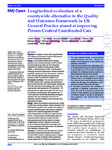Evaluation of a countywide alternative to QOF, aimed at improving person-centred coordinated care
| dc.contributor.author | Close, James | |
| dc.contributor.author | Fosh, B | |
| dc.contributor.author | Byng, Richard | |
| dc.contributor.author | Blackwell, R | |
| dc.contributor.author | Witts, L | |
| dc.contributor.author | Hall, L | |
| dc.contributor.author | Lloyd, Helen | |
| dc.date.accessioned | 2020-07-09T08:45:32Z | |
| dc.date.available | 2020-07-09T08:45:32Z | |
| dc.date.issued | 2019-06 | |
| dc.identifier.issn | 0960-1643 | |
| dc.identifier.issn | 1478-5242 | |
| dc.identifier.other | ARTN bjgp19X702905 | |
| dc.identifier.uri | http://hdl.handle.net/10026.1/15891 | |
| dc.description.abstract |
<jats:sec><jats:title>Background</jats:title><jats:p>The Quality Outcomes Framework (QOF) for general practice is one of the largest pay-for-performance schemes in the world. The scheme, however, is sometimes viewed as anachronistic, with recent proposals for a slimmed down QOF. Over the last few years, Somerset have been trialling a system with national implications: 55 GP practices in Somerset established the Somerset Quality Practice Scheme (SPQS) — a de-incentivisation of QOF — with the goal of redirecting resources towards improved Person Centred Coordinated Care (P3C), especially for those with long-term conditions.</jats:p></jats:sec><jats:sec><jats:title>Aim</jats:title><jats:p>An evaluation of the SPQS scheme to establish benefits (for example in provision of P3C) or disbenefits (for example in emergency admissions).</jats:p></jats:sec><jats:sec><jats:title>Method</jats:title><jats:p>A longitudinal evaluation from 55 SPQS practices and 17 regional controls. Patient experiences (2363 patients), staff experiences (127 professionals), and organisational data (for SPQS and control practices) were collected. Emergency admission data was analysed for ambulatory-sensitive conditions across Somerset.</jats:p></jats:sec><jats:sec><jats:title>Results</jats:title><jats:p>Discretion from QOF resulted in time savings in the majority of practices. Organisational data revealed a significant increase in P3C. Care delivery was improved via stronger federation-level agreements and informal networks, increased multidisciplinary working, reallocation of resources for other healthcare professionals and changes to the structure and timings of GP appointments. Patient and practitioner experiences were similar in SPQS versus control practices. No disbenefits were detected in admissions data.</jats:p></jats:sec><jats:sec><jats:title>Conclusion</jats:title><jats:p>The SPQS scheme leveraged time savings and reduced administrative burden via discretionary removal of QOF, enabling participating practices to engage in a number of schemes aimed at improving care for people with LTCs.</jats:p></jats:sec> | |
| dc.format.extent | bjgp19X702905-bjgp19X702905 | |
| dc.language | en | |
| dc.language.iso | en | |
| dc.publisher | Royal College of General Practitioners | |
| dc.subject | Health Services | |
| dc.subject | Clinical Research | |
| dc.subject | 8.1 Organisation and delivery of services | |
| dc.subject | Generic health relevance | |
| dc.title | Evaluation of a countywide alternative to QOF, aimed at improving person-centred coordinated care | |
| dc.type | journal-article | |
| dc.type | JOUR | |
| plymouth.author-url | http://bjgp.org/lookup/doi/10.3399/bjgp19X702905 | |
| plymouth.issue | suppl 1 | |
| plymouth.volume | 69 | |
| plymouth.publisher-url | https://bjgp.org/content/69/suppl_1.cover.pdf | |
| plymouth.publication-status | Published | |
| plymouth.journal | British Journal of General Practice | |
| dc.identifier.doi | 10.3399/bjgp19X702905 | |
| plymouth.organisational-group | /Plymouth | |
| plymouth.organisational-group | /Plymouth/Faculty of Health | |
| plymouth.organisational-group | /Plymouth/Faculty of Health/Peninsula Medical School | |
| plymouth.organisational-group | /Plymouth/Faculty of Health/School of Psychology | |
| plymouth.organisational-group | /Plymouth/REF 2021 Researchers by UoA | |
| plymouth.organisational-group | /Plymouth/REF 2021 Researchers by UoA/UoA03 Allied Health Professions, Dentistry, Nursing and Pharmacy | |
| plymouth.organisational-group | /Plymouth/REF 2021 Researchers by UoA/UoA04 Psychology, Psychiatry and Neuroscience | |
| plymouth.organisational-group | /Plymouth/Research Groups | |
| plymouth.organisational-group | /Plymouth/Research Groups/FoH - Community and Primary Care | |
| plymouth.organisational-group | /Plymouth/Research Groups/Institute of Health and Community | |
| plymouth.organisational-group | /Plymouth/Research Groups/Institute of Translational and Stratified Medicine (ITSMED) | |
| plymouth.organisational-group | /Plymouth/Research Groups/Institute of Translational and Stratified Medicine (ITSMED)/CCT&PS | |
| plymouth.organisational-group | /Plymouth/Research Groups/Plymouth Institute of Health and Care Research (PIHR) | |
| plymouth.organisational-group | /Plymouth/Users by role | |
| plymouth.organisational-group | /Plymouth/Users by role/Academics | |
| dcterms.dateAccepted | 2019-05-30 | |
| dc.rights.embargodate | 2020-7-15 | |
| dc.identifier.eissn | 1478-5242 | |
| dc.rights.embargoperiod | Not known | |
| rioxxterms.versionofrecord | 10.3399/bjgp19X702905 | |
| rioxxterms.licenseref.uri | http://www.rioxx.net/licenses/all-rights-reserved | |
| rioxxterms.licenseref.startdate | 2019-06 | |
| rioxxterms.type | Journal Article/Review |


